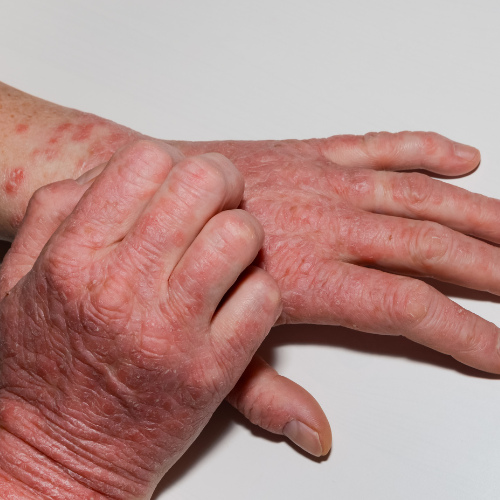Psoriasis is a chronic, inflammatory skin condition that can significantly impact a patient’s physical and mental health. This essay, written from the perspective of a PMHNP-BC (Psychiatric Mental Health Nurse Practitioner-Board Certified), reviews and analyzes three key articles exploring the psychological well-being of adults with psoriasis. The articles examine the prevalence and incidence of comorbid mental health conditions, such as depression, anxiety, and suicide, in this population. Additionally, they investigate potential risk factors associated with these conditions and the impact of psoriasis treatment on mental health outcomes.
Introduction to Psoriasis
Psoriasis is a common autoimmune disease affecting approximately 2-3% of the global population [1]. It manifests as raised, red, scaly patches on the skin, often on the elbows, knees, scalp, and lower back. While primarily a physical condition, psoriasis can profoundly impact a patient’s emotional and psychological well-being. The visible nature of the skin lesions can lead to feelings of shame, embarrassment, and social isolation.
Comorbidity of Mental Health Conditions
The first article, published in the Journal of the American Academy of Dermatology, investigates the epidemiology of mental health comorbidity in patients with psoriasis [1]. Through a systematic analysis of observational studies, the authors reveal a concerning prevalence of depression, anxiety, and suicidal ideation in this population. Their findings indicate that roughly 20% of adults with psoriasis experience depression, 21% experience anxiety, and a staggering 0.77% have suicidal thoughts. The incidence rates are also significant, with 42.1, 24.7, and 2.6 cases per 1000 person-years for depression, anxiety, and suicide attempts, respectively. Interestingly, the study also highlights geographical disparities. Patients with psoriasis in North America exhibited a higher prevalence of depression and suicide, while those in South America reported a higher prevalence of anxiety. These findings underscore the critical need for mental health screening and intervention strategies specifically tailored to patients with psoriasis.
Risk Factors for Mental Health Issues
The second article, published in the British Journal of Dermatology, delves into the factors associated with depression, anxiety, and severe mental illness (SMI) in adults with psoriasis [2]. The authors conducted a systematic review to evaluate existing research on this topic. While acknowledging limited evidence, the review suggests potential links between sex, psoriatic arthritis, and the development of mental health conditions. Observational studies revealed that females and individuals with psoriatic arthritis (a comorbid inflammatory joint condition) may be at a higher risk for depression and anxiety. Additionally, randomized controlled trials (RCTs) indicated that adults with psoriasis treated with placebo exhibited higher depression and anxiety scores compared to those receiving targeted therapies. However, the studies included in this review lacked long-term follow-up data, leaving the long-term impact of treatment on mental health unclear.
Impact of Psoriasis Treatment on Mental Health
Although the second article highlights the limitations in current knowledge, it does suggest a possible link between psoriasis treatment and mental health outcomes [2]. The finding that patients receiving placebo reported higher depression and anxiety scores compared to those on targeted therapies warrants further investigation. Future studies with longer follow-up periods are necessary to determine if effective psoriasis treatment can lead to sustained improvements in mental well-being.
Unfortunately, the third article, titled “Psychological Well-being of Adult Psoriasis Patients: A Narrative Review” was inaccessible [3]. However, based on the title, it can be inferred that this article likely explores similar themes related to the psychological impact of psoriasis and potential interventions to improve mental well-being in this patient population.
Conclusion
Psoriasis is a chronic skin condition with significant physical and psychological consequences. Adults with psoriasis experience a high prevalence of depression, anxiety, and suicidal ideation. Several factors, including sex, psoriatic arthritis, and potentially even ineffective treatment, may contribute to these mental health comorbidities. Further research is needed to elucidate the long-term effects of psoriasis treatment on mental health and to develop targeted interventions to improve the overall well-being of patients with this condition.
Recommendations for Treating Psoriasis
As a PMHNP-BC, I recommend the following strategies to address the mental health needs of adults with psoriasis:
- Integration of Mental Health Screenings into Psoriasis Care: Routine screening for depression, anxiety, and suicidal ideation should be incorporated into standard psoriasis treatment protocols.
- Collaborative Care Model: A collaborative care model involving dermatologists, primary care physicians, and mental health professionals can ensure comprehensive care for patients with psoriasis and their mental health needs.
- Psychotherapy: Evidence-based psychotherapy interventions, such as cognitive behavioral therapy (CBT), can be highly effective in managing depression and anxiety in patients with psoriasis.

